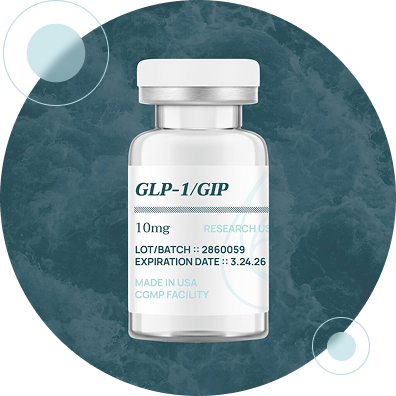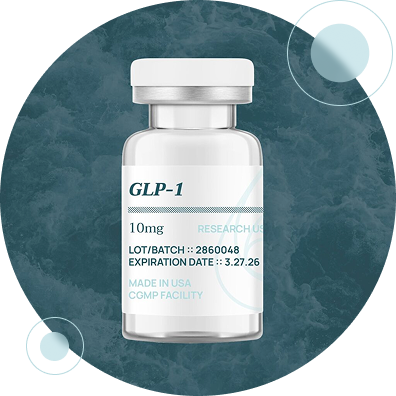Clinicians are turning to peptides not only for weight loss support, but to help modulate key systems tied to glucose regulation, energy balance, and inflammation. With research growing around metabolic dysfunction as a systemic issue, not just a lifestyle one, certain peptides are gaining attention for their potential to support more targeted, biology-driven interventions.
Below, we explore several peptides that are being studied for their role in metabolic balance, appetite regulation, and overall body composition. All injectables. All under research use.
1. Tirzepatide
Dual GIP/GLP-1 Receptor Agonist
Tirzepatide has received significant clinical interest for its ability to activate both GLP-1 and GIP receptors, two incretin hormones that influence satiety, insulin secretion, and energy expenditure.
In the SURMOUNT-1 trial, participants taking Tirzepatide lost an average of 22.5% of their body weight over 72 weeks, a result that exceeded outcomes seen with GLP-1 monotherapies.
Researchers are also exploring its impact on lipid profiles, inflammation markers, and insulin resistance pointing to potential use cases beyond weight control alone.


2. Semaglutide
GLP-1 Receptor Agonist
Already FDA-approved for type 2 diabetes and weight loss under certain names, Semaglutide continues to be one of the most studied metabolic peptides.
It works by mimicking GLP-1, a hormone that slows gastric emptying, increases satiety, and regulates blood sugar.
Clinical trials have shown body weight reductions of 15–18%, alongside improvements in fasting glucose and HbA1c.
Its relevance in metabolic care protocols continues to expand, particularly in research surrounding insulin sensitivity and cardiovascular risk factors.
3. BPC-157
Body Protective Compound - Gut Integrity and Inflammation
While not traditionally classified as a metabolic peptide, BPC-157 is being explored for its impact on gut health and systemic inflammation, two factors that influence metabolic function.
In preclinical models, BPC-157 has been shown to promote angiogenesis, enhance insulin receptor expression, and support gastric mucosal repair.
These effects may be particularly relevant in contexts where metabolic dysfunction is tied to chronic low-grade inflammation or impaired gut lining integrity.


4. NAD+
Mitochondrial Function and Energy Metabolism
NAD+ is a coenzyme essential for cellular energy production and metabolic regulation.
Levels of NAD+ decline with age and are associated with reduced mitochondrial efficiency, insulin resistance, and inflammatory activation.
Research on NAD+ supplementation has focused on its role in activating sirtuins and improving glucose metabolism, mechanisms that may help counteract the cellular aging associated with metabolic disease.
It’s no surprise that NAD+ is becoming a focal point in longevity and metabolic research. With clinicians increasingly interested in targeting root causes rather than symptoms, NAD+ has emerged as a go-to molecule for supporting mitochondrial resilience and energy homeostasis.
5. MOTS-c
Mitochondrial-Derived Peptide - Insulin Sensitivity and Fat Metabolism
MOTS-c is a naturally occurring peptide encoded by mitochondrial DNA, currently being explored for its role in metabolic regulation.
Early-stage research suggests that MOTS-c may improve glucose uptake in skeletal muscle, enhance insulin sensitivity, and promote fat oxidation.
In animal models, MOTS-c administration has been linked to improved metabolic flexibility, reduced weight gain, and increased endurance, making it a subject of growing interest in obesity and metabolic health research.


6. AOD-9604
Fragment of Human Growth Hormone - Fat Metabolism
AOD-9604 is a modified fragment of human growth hormone (HGH) that has been studied for its ability to stimulate lipolysis without affecting IGF-1 levels.
It’s often considered in contexts where reducing adipose tissue is a therapeutic priority.
Studies have shown it may help promote fat breakdown and prevent new fat accumulation, particularly visceral fat, making it a point of interest in body composition research.
GLP-1 Receptor Agonist
Metabolic Health in the Bigger Picture
Metabolic health isn’t just a concern for patients with obesity or diabetes.
It underpins energy, cognition, inflammation, recovery, and even mood, key systems that are frequently discussed across wellness, aesthetics, and performance-based care.
What’s becoming increasingly clear is that traditional approaches focused solely on weight loss or glucose control often miss the mark, especially when metabolic dysfunction is being driven by deeper physiological imbalances.
That’s where peptide research is carving out new territory.
Each compound highlighted in this post represents a different mechanism of action, from gut integrity and mitochondrial function to incretin signaling and lipid metabolism.
Rather than acting as isolated solutions, these compounds are being examined for how they may support broader physiological systems, potentially influencing how the body adapts to nutrition, movement, and other inputs over time.
These compounds represent a fast-moving category in peptide science, one that continues to generate interest as we deepen our understanding of metabolic regulation and systemic health.
Want Deeper Insights into How Peptides Intersect with Metabolic Health?
Join our newsletter for early insights into emerging blends, research developments, and strategies shaping the future of peptide therapy.
Metabolic health is no longer just about calorie counting and cardio.
Clinicians are turning to peptides not only for weight loss support, but to help modulate key systems tied to glucose regulation, energy balance, and inflammation. With research growing around metabolic dysfunction as a systemic issue, not just a lifestyle one, certain peptides are gaining attention for their potential to support more targeted, biology-driven interventions.
Below, we explore several peptides that are being studied for their role in metabolic balance, appetite regulation, and overall body composition. All injectables. All under research use.

1. Tirzepatide
Dual GIP/GLP-1 Receptor Agonist
Tirzepatide has received significant clinical interest for its ability to activate both GLP-1 and GIP receptors, two incretin hormones that influence satiety, insulin secretion, and energy expenditure.
In the SURMOUNT-1 trial, participants taking Tirzepatide lost an average of 22.5% of their body weight over 72 weeks, a result that exceeded outcomes seen with GLP-1 monotherapies.
Researchers are also exploring its impact on lipid profiles, inflammation markers, and insulin resistance pointing to potential use cases beyond weight control alone.

2. Semaglutide
GLP-1 Receptor Agonist
Already FDA-approved for type 2 diabetes and weight loss under certain names, Semaglutide continues to be one of the most studied metabolic peptides.
It works by mimicking GLP-1, a hormone that slows gastric emptying, increases satiety, and regulates blood sugar.
Clinical trials have shown body weight reductions of 15–18%, alongside improvements in fasting glucose and HbA1c.
Its relevance in metabolic care protocols continues to expand, particularly in research surrounding insulin sensitivity and cardiovascular risk factors.

3. BPC-157
Body Protective Compound - Gut Integrity and Inflammation
While not traditionally classified as a metabolic peptide, BPC-157 is being explored for its impact on gut health and systemic inflammation, two factors that influence metabolic function.
In preclinical models, BPC-157 has been shown to promote angiogenesis, enhance insulin receptor expression, and support gastric mucosal repair.
These effects may be particularly relevant in contexts where metabolic dysfunction is tied to chronic low-grade inflammation or impaired gut lining integrity.

4. NAD+
Mitochondrial Function and Energy Metabolism
NAD+ is a coenzyme essential for cellular energy production and metabolic regulation.
Levels of NAD+ decline with age and are associated with reduced mitochondrial efficiency, insulin resistance, and inflammatory activation.
Research on NAD+ supplementation has focused on its role in activating sirtuins and improving glucose metabolism, mechanisms that may help counteract the cellular aging associated with metabolic disease.
It’s no surprise that NAD+ is becoming a focal point in longevity and metabolic research. With clinicians increasingly interested in targeting root causes rather than symptoms, NAD+ has emerged as a go-to molecule for supporting mitochondrial resilience and energy homeostasis.

5. MOTS-c
Mitochondrial-Derived Peptide - Insulin Sensitivity and Fat Metabolism
MOTS-c is a naturally occurring peptide encoded by mitochondrial DNA, currently being explored for its role in metabolic regulation.
Early-stage research suggests that MOTS-c may improve glucose uptake in skeletal muscle, enhance insulin sensitivity, and promote fat oxidation.
In animal models, MOTS-c administration has been linked to improved metabolic flexibility, reduced weight gain, and increased endurance, making it a subject of growing interest in obesity and metabolic health research.

6. AOD-9604
Fragment of Human Growth Hormone - Fat Metabolism
AOD-9604 is a modified fragment of human growth hormone (HGH) that has been studied for its ability to stimulate lipolysis without affecting IGF-1 levels.
It’s often considered in contexts where reducing adipose tissue is a therapeutic priority.
Studies have shown it may help promote fat breakdown and prevent new fat accumulation, particularly visceral fat, making it a point of interest in body composition research.
GLP-1 Receptor Agonist
Metabolic Health in the Bigger Picture
Metabolic health isn’t just a concern for patients with obesity or diabetes.
It underpins energy, cognition, inflammation, recovery, and even mood, key systems that are frequently discussed across wellness, aesthetics, and performance-based care.
What’s becoming increasingly clear is that traditional approaches focused solely on weight loss or glucose control often miss the mark, especially when metabolic dysfunction is being driven by deeper physiological imbalances.
That’s where peptide research is carving out new territory.
Each compound highlighted in this post represents a different mechanism of action, from gut integrity and mitochondrial function to incretin signaling and lipid metabolism.
Rather than acting as isolated solutions, these compounds are being examined for how they may support broader physiological systems, potentially influencing how the body adapts to nutrition, movement, and other inputs over time.
These compounds represent a fast-moving category in peptide science, one that continues to generate interest as we deepen our understanding of metabolic regulation and systemic health.
Want Deeper Insights into How Peptides Intersect with Metabolic Health?
Join our newsletter for early insights into emerging blends, research developments, and strategies shaping the future of peptide therapy.
Want Deeper Insights into How Peptides Intersect with Metabolic Health?
Join our newsletter for early insights into emerging blends, research developments, and strategies shaping the future of peptide therapy.
